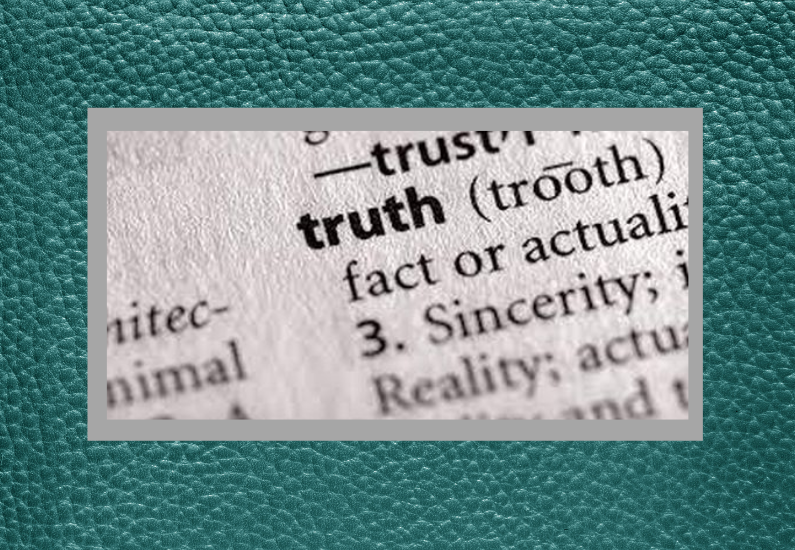This is an age old question. One definition says that truth is that which is true or in accordance with fact or reality. Another definition describes truth as a fact or belief that is accepted as true. According to these definitions, truth can be based on fact but it could also be adjustable based on whatever the current accepted belief happens to be.
Does truth change from culture to culture or from generation to generation or even from person to person? “Know your truth” and “speak your truth” are common phrases heard by some very influential people today. Whether we believe something to be true or not does it make it so? If I believe the earth is flat, that doesn’t make it so. If I believe the sun revolves around the earth, that doesn’t make it so. I can decide if I believe truth. I can’t decide what truth is. That has already been determined.
How do we determine truth? We start with what we know, with what we can see around us. We live in a beautiful world. The intricacies of each little critter is fascinating. The majesty and immenseness of mountain ranges give us a sense of awe and wonder. Awe that these things exist. Wonder at how they got here. The interdependency of one species to another and the habitats they dwell in tell us that something or someone, somehow, somewhere has a love of beauty and the wisdom to create such an amazing place. We enjoy all that is around us and we can see with our own eyes that a Creator was here first.
That Creator is truth. The Word He revealed to us is truth. Whether we believe it or not does not change that fact. We can determine what we believe truth is but we cannot change what truth actually is. The fact that God created the world has been truth from day one and does not change because someone doesn’t believe it. Since God is truth, then whatever God has said is truth. Whether we believe what He says is truth or not does not change the fact that it is true.
We can look at people who have been lifted up as offering truth and we can say to ourselves that we believe this person (Buddha, Mohammad, Joseph Smith, etc) is truth. It doesn’t make it so. These people were created by the same God that I was. These people have chosen to believe their own version of truth and to teach it to others. That does not make it truth.
Once we accept the fact that God is truth, how do we find out what He wants from us, for us? Is it enough to look to nature and learn about God? We can’t help but feel God’s presence when we are in nature. Just look up and see that that the heavens declare His glory and the skies declare what He has done (Psalm 19). But God wants more for us than to just be amazed. He wants a response from us. How do we know what that response is? God, the one and only true God, has revealed Himself to us.
If we say we believe that God is and that He is the Creator, we must believe what He says. He tells us in the book of Hebrews (1st chapter) that He has spoken in various ways to His people. He spoke one on one to the first people. At other times, He spoke to the fathers or patriarchs and through the prophets. Now He speaks to us through His Son, Jesus.
Those people who were living while Jesus walked among them were blessed to hear Him speak to them. What about us? Jesus died, was buried, resurrected and ascended back to heaven. How can we know what He wants us to do if Jesus isn’t physically here to tells us? Jesus didn’t leave us without help. He sent the Spirit to the apostles tell them what to say (John 16). These apostles spoke the things that the Spirit revealed to them (2 Corinthians 2). We are left with these words written down by these very men who the Spirit revealed the wisdom of God to. It is our responsibility and honor to discover God’s truth as we study His word.
Yes, the Bible is truth. David, the man after God’s own heart, tells us in Psalm 119 that God’s word is truth. Jesus tells us in John 17, while praying to God, His Father, that “Your word is truth”. From the beginning when God spoke the universe into existence to the days of Abraham, Isaac and Jacob, to the days of King David and the days Jesus walked on the earth and today as we read the Bible, God’s word is truth. We must respect it as truth.
We are told in Hebrews that the word of God is living. That does not mean that we can change it as we would like it to be. It means that it is powerful. It exposes us for who we are. It can make us feel shame and sorrow for our actions. It can make us feel angry at those who have tried to hide truth from us. It can make us feel the desire to change our lives to follow God’s will. It can make us feel triumph when we obey truth and become part of God’s family. It can make us feel joy at the love God showers on us. It can make us feel hope as we look to the future and know that this world is not all there is, that God has offered us eternal life.
Read the Bible — God’s word, truth. Study it. Live by it. Don’t let anyone try to alter it or water it down. Be strong and courageous enough to accept truth as it is and respond to it honestly. Great blessings are waiting for any and everyone who is willing to do the hard thing and follow God.
“Eye has not seen, nor ear heard,
Nor have entered into the heart of man
The things which God has prepared for those who love Him.” 1 Corinthians 2:9








0 Comments